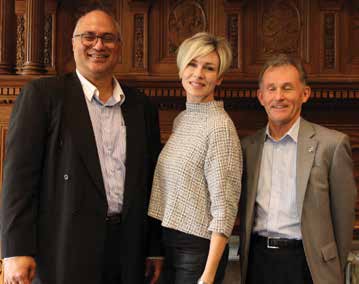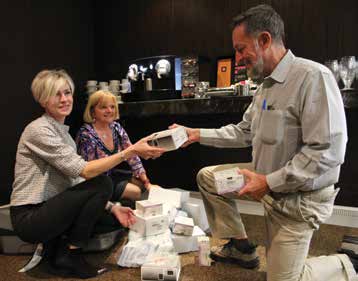The College acknowledges the support of Send Hope Not Flowers to the Pacific Society for Reproductive Health for maternal health projects in Pacific island countries.
On Friday 13 May, the RANZCOG Global Health Committee was pleased to host a special presentation of a donation of $30 000 by Send Hope Not Flowers (SHNF) Director, Emma Macdonald, to the Pacific Society for Reproductive Health (PSRH), represented by Dr Alec Ekeroma and Prof Peter Stone. These funds have been allocated to three maternal health projects to be undertaken in the Pacific island countries (PICs) as well as support for delivery of a PSRH Pacific Emergency Maternal and Neonatal Training train-the-trainers course in July. The projects approved by the PSRH Executive Committee are: the provision of a training room for student midwives at the University of Goroka, Papua New Guinea; a gestational diabetes research project in American Samoa; and a project to map the specialist medical workforce needs in the PICs.
Ms Macdonald said: ‘Through the generosity of Australian women and their families, SHNF is happy to assist PSRH by funding these initiatives. Having just returned from a brief visit with the committed staff at the Port Moresby General Hospital, I was able to see firsthand some of the challenges and shortages faced by staff at the frontline, but I was moved by the love between the mothers and their newborns, something new mums the world over have in common. We are thrilled to be able to support PSRH in its endeavours and thank RANZCOG for inviting me here today to acknowledge the initiative.’
On accepting the funds on behalf of PSRH, Dr Alec Ekeroma said, ‘We are absolutely delighted to have formed a connection with Send Hope Not Flowers. We could not fulfil our Society’s aims without the kind donation of organisations such as SHNF and this donation will go a long way in enabling some of our PSRH projects to move ahead.’
The relationship between RANZCOG, SHNF and PSRH is strong, with a number of projects in progress. These support maternal healthcare at its most basic level, especially in areas of high maternal and neonatal mortality and morbidity, such as Papua New Guinea, Vanuatu and the Solomon Islands. Targeted training and upskilling opportunities, together with practical support to meet needs and overcome shortages, enable local healthcare workers to carry out their work, making all the difference. As a network, RANZCOG, PSRH and SHNF look forward to increasing and maximising opportunities to provide worthwhile, targeted and efficient projects into the future, with appropriate evaluation of those activities post-delivery.

Dr Alec Ekeroma (PSRH), Emma Macdonald (SHNF) and Peter Stone (PSRH) meet for the presentation.

Emma Macdonald, Carmel Walker and Prof Glen Mola (RANZCOG Global Health Committee) with donated supplies for Port Moresby General Hospital.





Leave a Reply